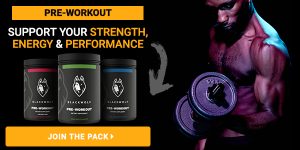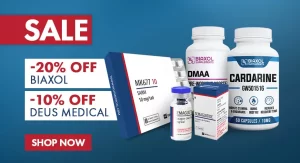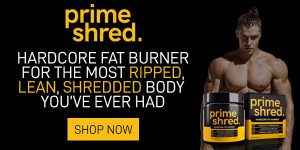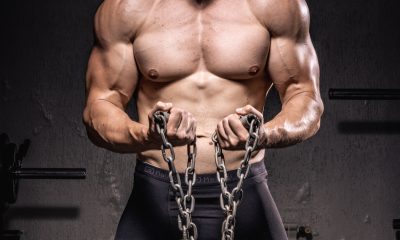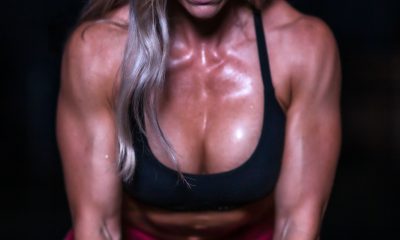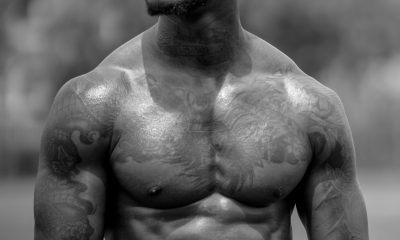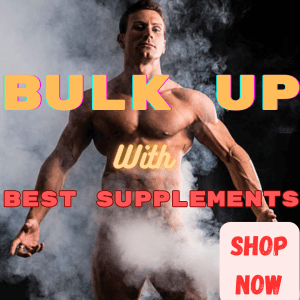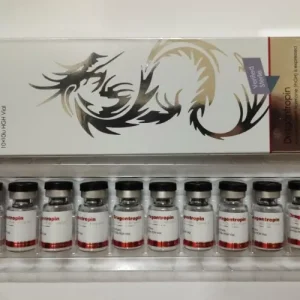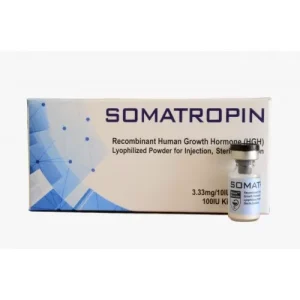Steroids
How to Retain your Physique after Retiring from Bodybuilding

What happens when the god of muscle mass retires? The question is as hard for them as it is for you. Losing their celebrity status, which comes with endorsements and other financial benefits, is the first reality that hits them. Then, they start wondering what they will do with the amount of time in their hands now that their schedule is relaxed. However, bodybuilders can always stay active even when their careers end. Nothing will stop you from going to the gym as frequently as you want. Additionally, retired bodybuilders can embark on other bodybuilding careers, like coaching, to keep themselves busy.
Remaining active post-bodybuilding is one thing; retaining your physique is the other. Many retired bodybuilders are worried about how it will happen to their bodies when they stop training. What many of them don’t know is that they can retain their physique after retiring. However, there will be some noticeable changes because of aging.
Strive for Better Health, Not an Attractive Body
There comes a time when all that matters is your health. By the time bodybuilders retire, they will have exhausted themselves during rigorous workout sessions. It would help to keep the blood flowing normally even as you hang your bodybuilding boots. Light exercises will help your blood usually circulate. During such workouts, blood is pumped to stimulate your muscles and keep them fostered. This process causes muscle growth, which is only for a short time, and after your workouts, they start to decrease gradually.
Aging is not bad. It is bad enough when you start losing memory and find it hard to regain the vigor you once had while a youngster. The worst is the loss of muscles and bone density with normal aging. Keep your muscles fit for a long, even after retiring from bodybuilding, by adding more protein to your diet and having regular resistance training to maintain your muscles and increase your metabolism. Sagging muscles is very stressful because you end up losing your body shape.
There are several ways to prevent muscle loss. After retiring from bodybuilding, the most obvious thing that happens to you is losing the right amount of muscles, not because you stopped training or eating a fair amount of proteins but because you no longer have anabolic steroids. It would be best to do many resistance exercises either by lifting weights or stretching your hands as long as you have to stretch muscles.
Treat Your Retirement Like a Holiday
Just because you are no longer part of bodybuilding doesn’t necessarily mean that you focus on other essential aspects to retain your physique. You do not need to take more of your time eating heavily, using supplements, or training to the point of getting exhausted. Appreciate what you have already achieved and begin training purposely for your well-being and overall health.
Eat Foods with Targeted Nutrients Only
Retaining your physique is not difficult, as you will go about it the same way you would if you wanted to amass muscles. Changing your training and eating is the only key difference to consider with retaining and maintaining your physique. Excess intake of calories is no longer needed since your aim is not muscle building but retaining the right physique. You should alter your previous eating schedule and adjust to eating healthy foods that will help you support your muscles. Reducing the calories that make the body grow stronger and bigger will do you a great deal!
Train yourself on the standard three meals daily, however hard it may seem. You should always stick to a strict healthy diet; you are just trying to avoid the excess calories. In physique retaining, nutrition is the most critical aspect to consider. Even if you are on less frequent workouts but still taking lots of calories, your body will utilize the inputs and build muscles. Consider getting enough proteins for your activity level. Increase the water intake levels to stay dehydrated to help maintain the right muscle balance.
Related Article:: Best Diet Plan for Bodybuilders 2019
Reduce Daily Training Hours to a Maximum of 2
Like healthy eating, training goes a long way in ensuring you have an excellent body post-bodybuilding. You may fear losing your perfect body rapidly if you don’t train. Know that you cannot lose a lot of muscles overnight, especially if you keep training. Nonetheless, practice does not need to be as rigorous as it used to be. Do a full-body workout for a maximum of two hours every day. That should be enough to keep you healthy.
When training with higher repetition, it will leave you a sick pam and your muscles engorged with blood. You should avoid the heavyweights you were used to, for your target is retaining the physique. Use the approach of not utilizing many intensity tactics and reducing the speed of your workouts. You will effectively keep the muscles by not often lifting heavy weights or as intensively used to doing so.
Don’t Stop Taking Supplements
Consider using supplement products to improve nutrient metabolism and weight loss. Most importantly, use Chromium picolinate as your most preferred supplement since its nutritional contents are standardized. Also, using a multivitamin and fish oils works best. They are standard for human health and don’t directly lead to growing muscles. The money that could otherwise buy excess proteins can be a good saving for you to venture into something else.
Cardio Helps Your Heart Adjust
Your heart has been responsible for everything you ever did as a bodybuilder. You have it to thank for the many contests and titles you won. Because you do not want to get more muscles, you can utilize this time to train a different part of your body, specifically the cardiovascular system. Opt for excess cardio, which is suitable for impeding muscle gain, and focus on it now that you are already satisfied with your number of muscles. You can quickly lose some body fat to make you look better and benefit from an improved cardiovascular condition. Additionally, try jogging on the treadmill a few days a week as you maintain a healthy diet.
Have Enough Rest and Sleeping Time
Natural testosterone and human growth hormones are set on repairing and rebuilding your body. Sleeping is the best time for rebuilding. Get enough restful sleep to help in this process, enough time for relaxation, and keep your self-stress free because the emotional stress will stimulate the catabolic stress hormones, leading to a speedy loss of muscle pump.
Set Personal Goals
Now that your goal is retaining a sound body after many years of bodybuilding, it is the perfect time to improve certain aspects of your life. If you are not disciplined and committed to your obligations, you might not achieve the best of your desires. After maintaining the same drive, focus, and determination you have, you will one day be content with what you have achieved.
Must Read:: Top Natural Oral Steroids to Supercharge Your Muscle Growth
Conclusion
Post-bodybuilding does not signal the end of training and targeted workouts. People who have never been bodybuilders train daily not to gain muscle but to remain healthy. That should be your mindset as you begin a new chapter of your life. Although the new routine may appear strange, you will slowly adjust and come to enjoy it. Your goal should be to retain that incredible body you have built through the years.
Most importantly, remember it is your time to relax and enjoy the fruits of your labor. You no longer have to kill yourself with training because there is no contest pressure. All you’re doing now is remaining healthy with light exercises.
Steroids
Decoding IGF-1 LR3: A Guide to its Benefits
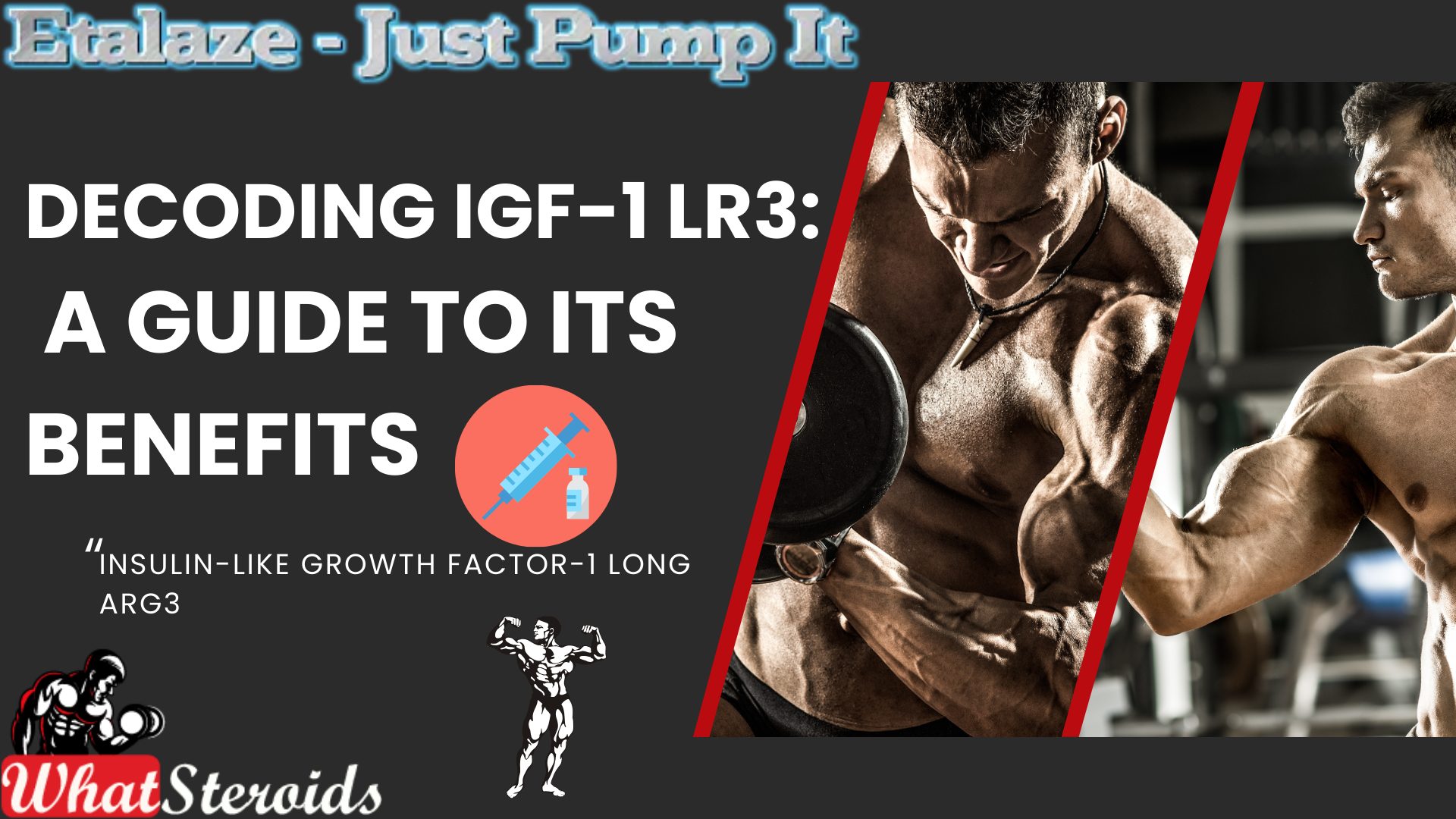
IGF-1 LR3 (Insulin-like Growth Factor-1 Long Arg3) is a synthetic variant of IGF-1, a hormone produced by the liver in response to growth hormone (GH). Unlike GH, which works indirectly, IGF-1 directly facilitates the growth and repair of muscle cells.
Related Article: Ostarine for Beginners; The Ultimate Guide
This modified version of IGF-1 is engineered to avoid binding with IGF-binding proteins, extending its half-life to 20–30 hours. As a result, it remains active in the body significantly longer than natural IGF-1.
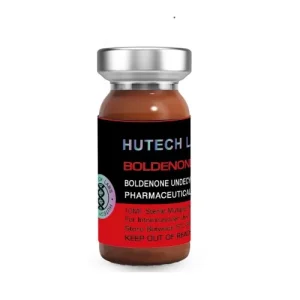 Click here to BuyBoldenone 300 by Hutech
Click here to BuyBoldenone 300 by Hutech
Many performance athletes incorporate IGF-1 LR3 post-workout to enhance muscle growth, speed up recovery, and support fat loss. When injected into specific muscle groups, it often produces localized effects. Additionally, it helps with nutrient distribution and, in some cases, improves insulin sensitivity.
On the other hand, human growth hormone (HGH) operates more broadly and indirectly, stimulating the liver to produce IGF-1 and offering more systemic benefits such as improved skin health, joint support, and fat reduction, albeit at a slower pace.
Typical IGF-1 LR3 doses range from 20–50 mcg daily, administered subcutaneously or intramuscularly, often following a workout.
Key Features of IGF-1 LR3
Enhanced Bioavailability: It avoids binding with IGF-binding proteins, increasing its potency.
Muscle Growth & Repair: Directly stimulates muscle cell proliferation and differentiation.
Improved Nutrient Distribution: Helps shuttle nutrients into muscle cells, supporting recovery.
Potential Fat Loss Benefits: Some users report improved insulin sensitivity and fat metabolism.
Mechanism of Action
IGF-1 LR3 interacts with IGF-1 receptors on muscle cells, activating pathways like PI3K-AKT and MAPK, which are crucial for cell growth and regeneration. This makes it a powerful tool for bodybuilders and athletes looking to optimize recovery and muscle development.
What Are the Top 10 Alternatives to IGF-1 LR3?
Here are some of the top alternatives to IGF-1 LR3, each with unique benefits for muscle growth, recovery, and performance:
BPC-157 – Known for its regenerative properties, it enhances healing and tissue repair.
CJC-1295 – A growth hormone-releasing peptide that boosts GH levels for muscle development.
Ipamorelin – Stimulates GH release with minimal side effects, making it a safer option.
MK-677 (Ibutamoren) – A potent GH secretagogue that promotes muscle growth and fat loss.
Sermorelin – Encourages natural GH production, supporting recovery and lean muscle gains.
Tesamorelin – Primarily used for fat loss, but also aids in muscle preservation.
Follistatin-344 – Inhibits myostatin, allowing for increased muscle hypertrophy.
PEG-MGF (Pegylated Mechano Growth Factor) – Enhances muscle repair and growth post-exercise.
GHRP-6 – Stimulates appetite and GH release, supporting muscle mass gains.
GHRP-2 – Similar to GHRP-6 but with fewer hunger-related side effects.
Each of these peptides has distinct mechanisms and benefits.
Must Read: Are Nootropics a Better Option to AAS?
Potential Risks Associated With IGF-1 LR3
IGF-1 LR3 comes with several potential risks, especially for bodybuilders using it to enhance muscle growth. Here are some key concerns:
Hypoglycemia (Low Blood Sugar) – IGF-1 LR3 increases glucose uptake in muscle cells, which can lead to dangerously low blood sugar levels if not managed properly.
Organ Growth – Since IGF-1 affects all tissues, excessive use may lead to unwanted growth in organs, increasing health risks.
Cancer Risk – IGF-1 plays a role in cell proliferation, and elevated levels have been linked to an increased risk of certain cancers.
Water Retention & Edema – Some users experience bloating and fluid retention, which can affect performance and aesthetics.
Joint Pain & Stiffness – Excessive IGF-1 levels may contribute to joint discomfort due to increased tissue growth.
Cardiovascular Issues – There is some concern that IGF-1 LR3 could contribute to heart enlargement or other cardiovascular complications.
Desensitization – Long-term use may reduce the body's natural IGF-1 production, leading to dependency
Overall
IGF-1 LR3's ability to bypass IGF-binding proteins makes it more potent but also increases the likelihood of desensitization with prolonged use. For those considering it, careful dosing and monitoring are crucial to mitigate side effects.
Steroids
AOD-9604: The Fat-Burning Peptide Explained
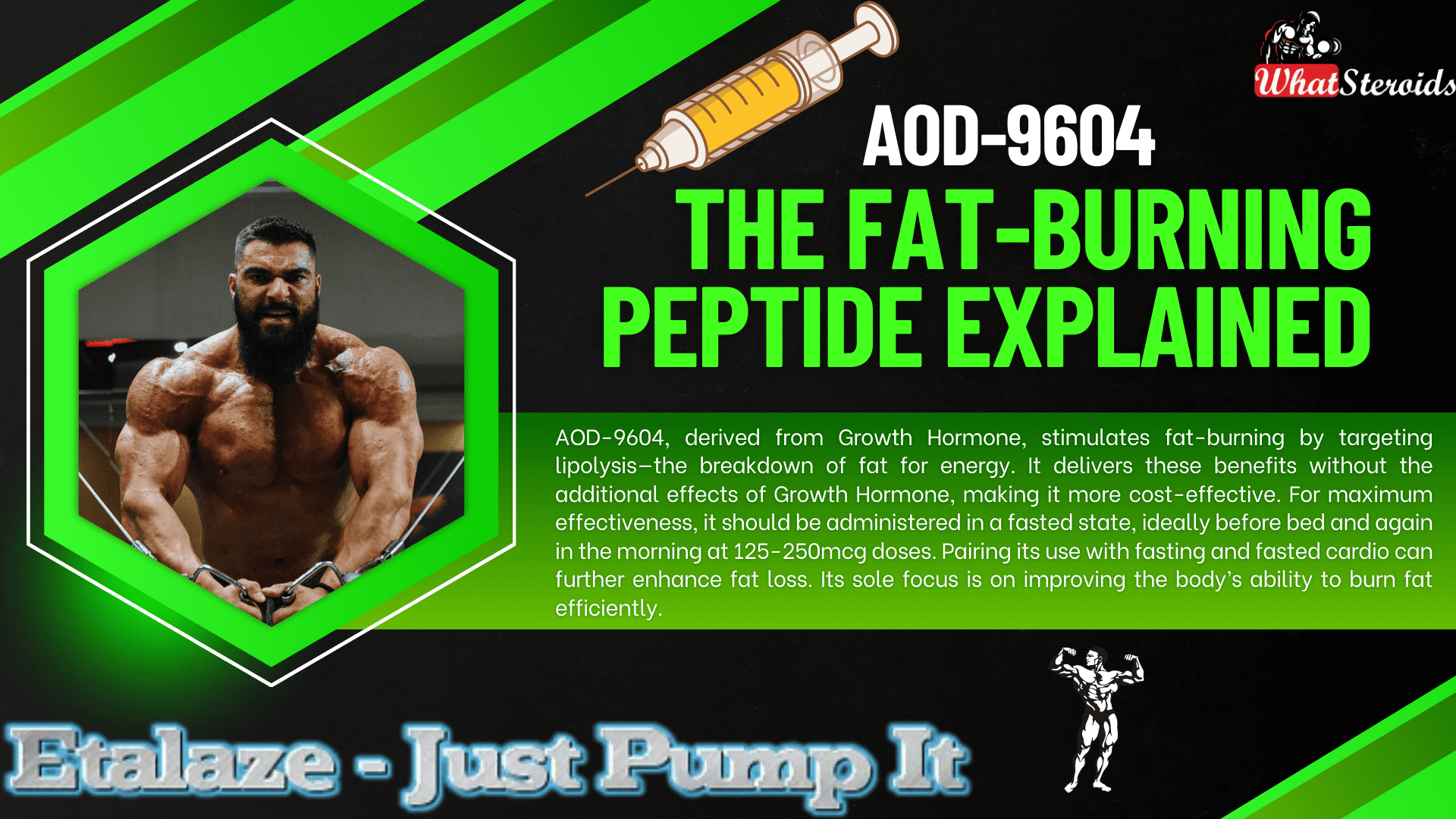
AOD-9604, along with the similar HGH Frag 176-191, is a peptide derived from Growth Hormone that includes only the amino acids in HGH responsible for stimulating fat breakdown, known as lipolysis.
This means that these peptides offer the fat-burning benefits of HGH without its other effects—whether beneficial or adverse—and come at a lower cost.
Related Article: Anavar Cycle for Men and Women
Lipolysis refers to the process where fat cells are broken down to be utilized as energy. AOD-9604 promotes accelerated fat loss by increasing the body's use of fat as fuel.
For optimal results, the peptides should be used in a fasted state. AOD-9604 and Frag 176-191 are most effective when administered at a dose of 125-250mcg before bedtime (at least 3-4 hours after eating) and in the morning at the same dose, followed by a fasting period of 3-4 hours, ideally combined with fasted cardio.
Check Out Dragontropin HGH 100 IU by Dragon Pharma
Similar Peptides with Fat-Burning Effect
Here’s a list of 10 peptides similar to AOD-9604, each with a brief description:
Ipamorelin: A growth hormone-releasing peptide (GHRP) that stimulates the natural release of growth hormone, promoting fat loss, muscle growth, and improved recovery without affecting other hormones like cortisol or prolactin.
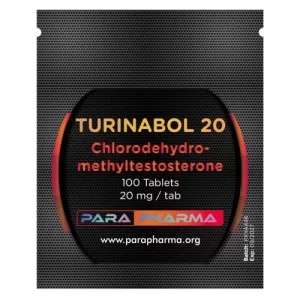 Click Here to Buy: Turinabol 20 by Para Pharma
Click Here to Buy: Turinabol 20 by Para Pharma
CJC-1295: A peptide that increases growth hormone and IGF-1 levels, aiding in fat loss, muscle gain, and improved sleep quality. It has a long half-life, making it convenient for users.
HGH Frag 176-191: A fragment of human growth hormone specifically designed for fat-burning. It targets adipose tissue without the broader effects of full-length HGH.
Tesamorelin: Known for reducing visceral fat, this peptide stimulates the release of growth hormone and is often used for weight management and metabolic health.
BPC-157: While primarily known for healing and recovery, BPC-157 can support fat loss indirectly by improving gut health and reducing inflammation.
Melanotan II: Originally developed for skin tanning, it also has appetite-suppressing properties, making it useful for weight management.
Thymosin Beta-4 (TB-500): Focused on healing and recovery, it can enhance physical performance and indirectly support fat loss through improved activity levels.
GHRP-6: A growth hormone-releasing peptide that boosts appetite and metabolism, aiding in muscle growth and fat loss.
Semaglutide: A GLP-1 receptor agonist that regulates appetite and blood sugar levels, making it effective for weight loss and metabolic health.
MK-677 (Ibutamoren): A growth hormone secretagogue that increases growth hormone and IGF-1 levels, promoting fat loss, muscle gain, and improved recovery.
List of Peptides With a Counteractive Effect Bodybuilders Must Avoid
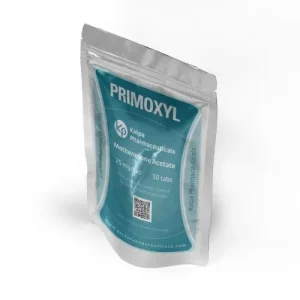 Click Here to Buy Primoxyl 25 by Kalpa Pharmaceuticals
Click Here to Buy Primoxyl 25 by Kalpa Pharmaceuticals
Some peptides can inadvertently lead to fat gain due to their effects on metabolism and appetite regulation. Here are a few that bodybuilders might want to avoid or use cautiously:
- GHRP-6 – While it stimulates growth hormone release, it also significantly increases appetite, which can lead to excess calorie consumption and fat gain.
- IGF-1 LR3 – This peptide enhances muscle growth but can also promote fat storage if not carefully managed with diet and training.
- MK-677 (Ibutamoren) – Though technically a growth hormone secretagogue rather than a peptide, it boosts GH levels but often leads to increased hunger and potential fat accumulation.
- CJC-1295 with DAC – While effective for muscle growth, its prolonged GH release can sometimes lead to unwanted fat retention if not paired with a strict diet
Overall
AOD-9604, derived from Growth Hormone, stimulates fat-burning by targeting lipolysis—the breakdown of fat for energy. It delivers these benefits without the additional effects of Growth Hormone, making it more cost-effective. For maximum effectiveness, it should be administered in a fasted state, ideally before bed and again in the morning at 125-250mcg doses. Pairing its use with fasting and fasted cardio can further enhance fat loss. Its sole focus is on improving the body’s ability to burn fat efficiently.
Read More: How Much Do You Know About B-AET? A Fat Burner You’ve Been Missing
Bodybuilding
Understanding Trenbolone-Induced Cough (“Tren Cough”)
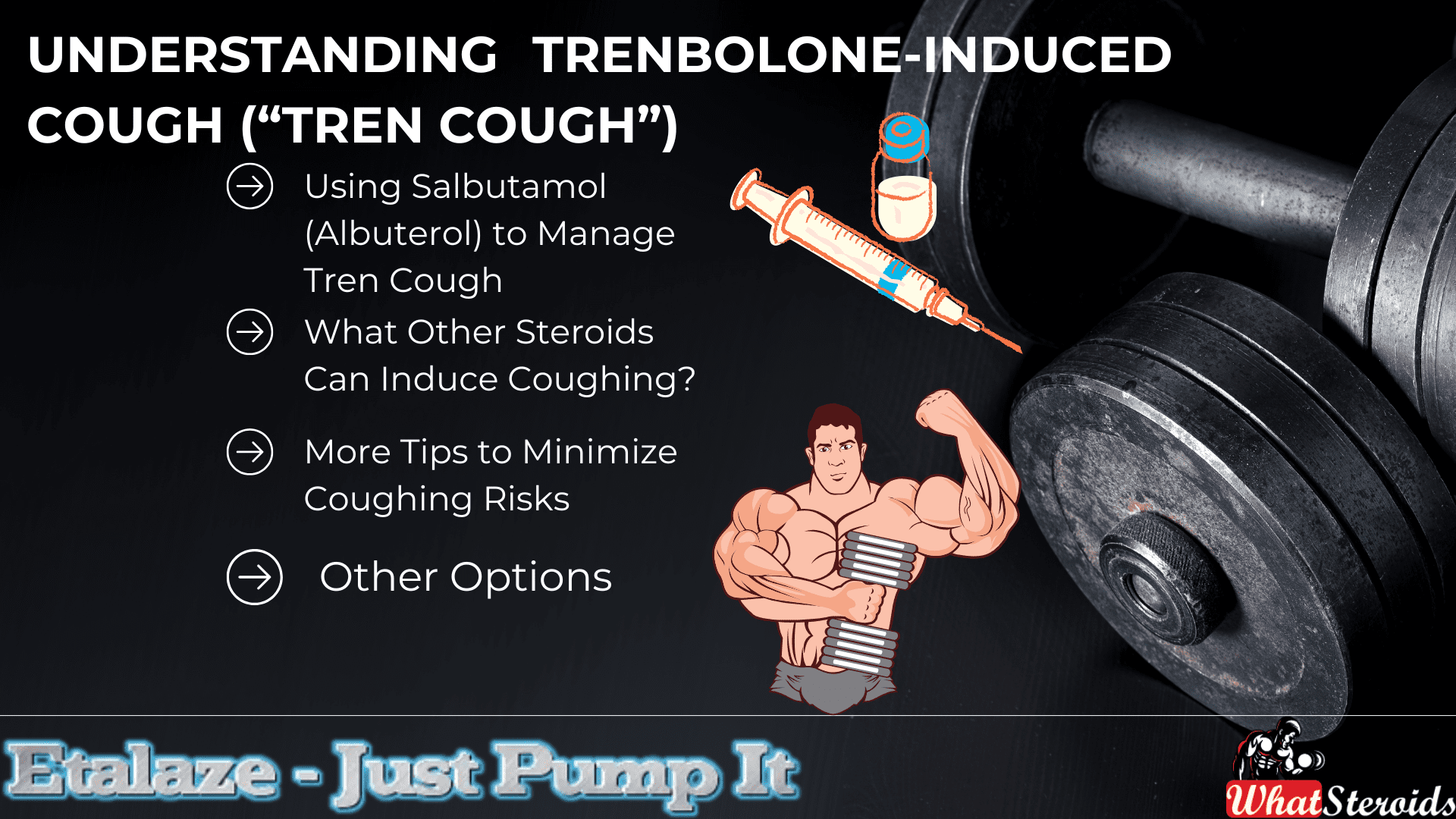
Trenbolone, a potent anabolic steroid, can sometimes cause “tren cough”—a sudden and intense coughing episode shortly after injection. Although not exclusive to Trenbolone, it is more commonly associated with this substance due to its highly irritant nature.
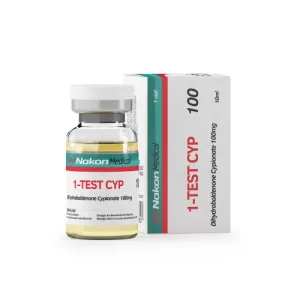 Click Here To Buy 1-Test Cyp 100 by Nakon Medical
Click Here To Buy 1-Test Cyp 100 by Nakon Medical
Mechanisms Behind Tren Cough
Solvent and Carrier Irritation
Trenbolone formulations often include volatile solvents like benzyl alcohol or benzyl benzoate, which may irritate lung tissues when absorbed quickly into systemic circulation.
Prostaglandin Release
Trenbolone promotes increased production of prostaglandins, particularly PGF2α. This compound triggers contraction in the smooth muscles of the lungs, leading to bronchoconstriction and coughing.
Micro-Oil Embolism
Tiny oil droplets from an injection can reach capillaries and travel to the lungs, causing mild embolic reactions that lead to temporary oxygen deprivation and coughing.
Histamine and Mast Cell Activation
For some individuals, Trenbolone triggers histamine release and mast cell activation, mimicking an allergic response and causing bronchospasms and cough reflexes.
Related Article: Best Syringes for Steroid Injection on Amazon
Using Salbutamol (Albuterol) to Manage Tren Cough
- Salbutamol, a widely-used β2-adrenergic receptor agonist, can alleviate tren cough symptoms by:
- Relaxing bronchial muscles, easing spasms that cause coughing.
- Inhibiting prostaglandin effects, reducing bronchoconstriction associated with PGF2α.
- Opening airways, preventing severe respiratory restrictions in susceptible individuals.
Application Methods
Inhaler (Optimal)
Take 1–2 puffs of salbutamol (100–200 mcg) 5–10 minutes before a Trenbolone injection. If coughing occurs afterward, additional puffs can swiftly resolve the issue.
Oral Tablets (Moderate)
Consuming 2–4 mg tablets 30–60 minutes before injection offers slower, longer-lasting relief but may be less effective than inhalation methods.
Nebulizer (Severe Cases)
For individuals with frequent episodes, nebulized doses of 2.5 mg salbutamol can provide substantial relief.
Preventive Measures to Reduce Tren Cough Risk
- Inject slowly to minimize systemic absorption and irritant effects.
- Split doses to lower reaction severity with smaller quantities.
- Opt for ventrogluteal injection sites, which have fewer blood vessels, reducing oil embolism risk.
- Choose lower-concentration solutions to lessen irritation, as higher concentrations (e.g., Tren Ace 200 mg/ml) are more likely to provoke reactions.
What Other Steroids Can Induce Coughing?
Here's a curated list of peptides, SARMs, and PEDs that may potentially cause coughing or respiratory irritation in bodybuilders and fitness enthusiasts:
Peptides
IGF-1 LR3 (Insulin-like Growth Factor): Known for its anabolic effects, IGF-1 LR3 can occasionally cause mild respiratory irritation due to systemic absorption.
TB-500 (Thymosin Beta-4): While rare, improper injection techniques or high doses may lead to transient coughing episodes.
GHRP-6 (Growth Hormone-Releasing Peptide): This peptide can stimulate histamine release, potentially leading to bronchospasms and coughing.
SARMs (Selective Androgen Receptor Modulators)
RAD-140: (Testolone) Some users report throat irritation or coughing, often attributed to solvents used in liquid formulations.
YK-11: Known for its myostatin-inhibiting properties, YK-11 may cause mild respiratory discomfort in sensitive individuals.
LGD-4033 (Ligandrol): Though uncommon, some users experience coughing due to carrier solvents or allergic-like reactions.
PEDs (Performance-Enhancing Drugs)
Boldenone Undecylenate (Equipoise): This injectable steroid can cause “Equipoise cough,” similar to tren cough, due to oil embolism or irritant solvents.
Testosterone Suspension: The water-based formulation may lead to coughing episodes if injected improperly or absorbed rapidly.
Nandrolone Decanoate (Deca-Durabolin): While less common, coughing can occur due to histamine release or systemic irritation.
More Tips to Minimize Coughing Risks
- Use proper injection techniques to avoid embolic reactions.
- Opt for lower-concentration solutions to reduce irritant effects.
- Consider antihistamines or bronchodilators for individuals prone to respiratory sensitivity.
Read More: Joint Stiffness: How to Manage It While on AAS
Are There Alternatives to Cough-inducing Steroids?
Here are some alternatives to cough-inducing steroids that can provide similar anabolic effects while minimizing respiratory irritation:
Peptides
IGF-1 LR3 (Insulin-like Growth Factor)
Promotes muscle growth and recovery without the irritant properties of certain steroids.
TB-500 (Thymosin Beta-4)
Enhances tissue repair and reduces inflammation, making it a safer option for recovery.
BPC-157 (Body Protection Compound)
Known for its healing properties, it supports muscle repair and joint health.
SARMs (Selective Androgen Receptor Modulators)
RAD-140 (Testolone)
Provides significant muscle-building effects with fewer systemic side effects compared to traditional steroids.
LGD-4033 (Ligandrol)
Boosts lean muscle mass and strength without the risk of respiratory irritation.
MK-677 (Ibutamoren)
Stimulates growth hormone release, aiding in muscle growth and recovery.
Natural Alternatives
Turkesterone
A plant-based ecdysteroid that supports muscle protein synthesis and recovery.
Ecdysterone
Another natural compound that mimics anabolic effects without the harsh side effects.
Creatine Monohydrate
Enhances strength and muscle mass through improved energy production during workouts.
Other Options
Human Growth Hormone (HGH)
Promotes muscle growth and fat loss, though it requires careful monitoring due to potential side effects.
Testosterone Boosters
Natural supplements like D-Aspartic Acid or Tribulus Terrestris can help optimize testosterone levels for muscle growth.
SARMs Alternatives
Legal and safer versions of SARMs are available, offering similar benefits without the risks associated with traditional SARMs.
Overall
We have explored the phenomenon of "tren cough," a sudden, intense coughing episode often caused by Trenbolone injections due to factors like solvent irritation, prostaglandin release, micro-oil embolism, or histamine activation. Preventive measures such as using salbutamol (via inhaler, oral tablets, or nebulizer), injecting slowly, splitting doses, and opting for lower-concentration solutions were highlighted.
Additionally, alternative compounds to tren cough-inducing steroids were discussed, including peptides like IGF-1 LR3 and TB-500, SARMs such as RAD-140 and LGD-4033, and natural options like Turkesterone, ecdysterone, and creatine. These alternatives provide anabolic effects while minimizing respiratory side effects. The conversation also underscored the importance of proper injection techniques and thoughtful compound selection to reduce risks.
-

 Steroids2 years ago
Steroids2 years agoShavers and Other Body Grooming Equipment for Bodybuilders In 2023
-

 Steroids2 years ago
Steroids2 years agoChatGPT and Other Avenues to Find Great Bodybuilding Coaches
-
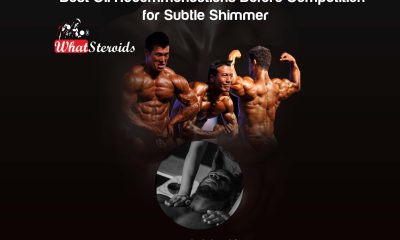
 Steroids2 years ago
Steroids2 years agoBest Oil Recommendations Before Competition for Subtle Shimmer
-
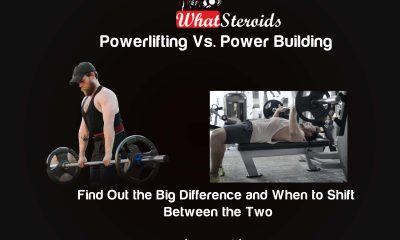
 Steroids2 years ago
Steroids2 years agoPowerlifting Vs Power Building: Find Out the Big Difference and When to Shift Between the Two
-

 Nutrition2 years ago
Nutrition2 years agoEverything Nutritional Food: What’s Too Much Or Too Little
-
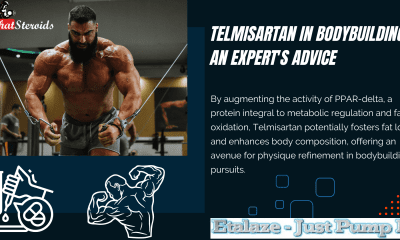
 Bodybuilding Products1 year ago
Bodybuilding Products1 year agoTelmisartan In Bodybuilding: An Expert’s Advice
-
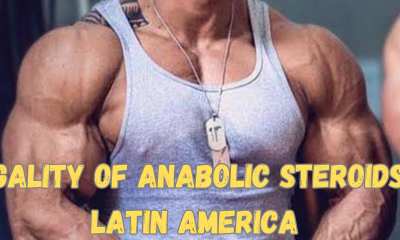
 Anabolic Steroids1 year ago
Anabolic Steroids1 year agoLegality of Anabolic Steroids In Latin America
-
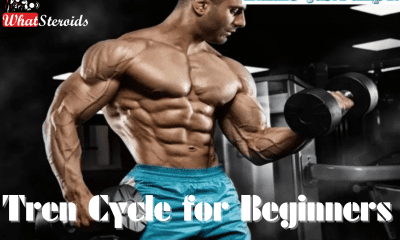
 Beginners2 years ago
Beginners2 years agoTren Cycle for Beginners
-
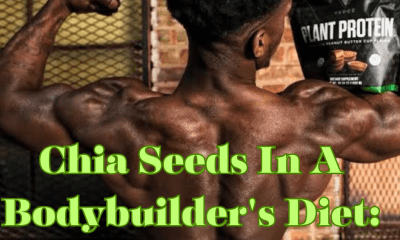
 Bodybuilding1 year ago
Bodybuilding1 year agoChia Seeds in A Bodybuilder’s Diet: An Expert’s Advice
-
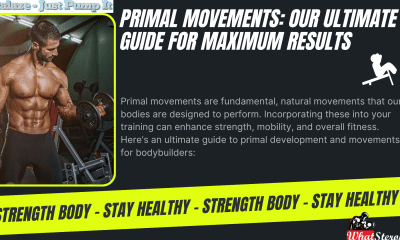
 Bodybuilding8 months ago
Bodybuilding8 months agoPrimal Movements: Our Ultimate Guide for Maximum Results
-
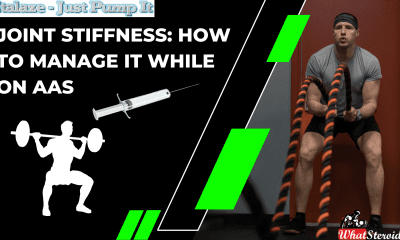
 Anabolic Steroids9 months ago
Anabolic Steroids9 months agoJoint Stiffness: How to Manage It While on AAS
-
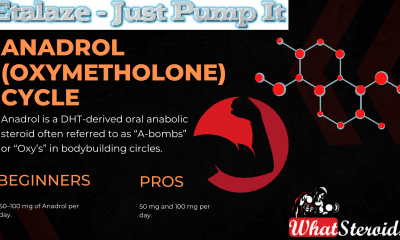
 Steroids12 months ago
Steroids12 months agoAnadrol Cycle: Benefits, Doses, Alternatives, etc.
-
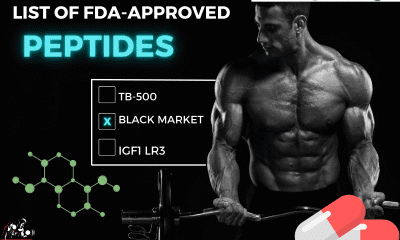
 Bodybuilding1 year ago
Bodybuilding1 year agoList of FDA-Approved Peptides
-
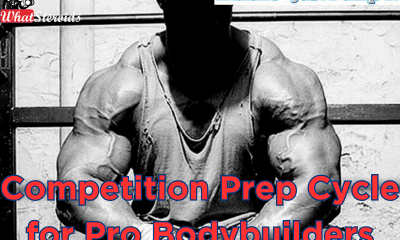
 Bodybuilding2 years ago
Bodybuilding2 years agoCompetition Prep Cycle for Pro Bodybuilders
-
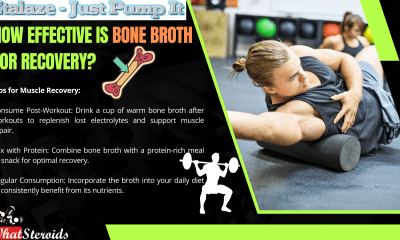
 Bodybuilding9 months ago
Bodybuilding9 months agoHow Effective is Bone Broth for Recovery?
-
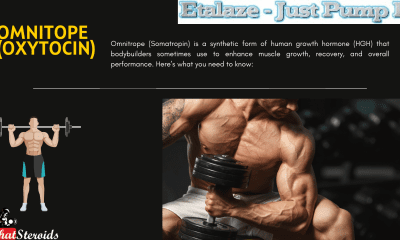
 Steroids10 months ago
Steroids10 months agoOmnitope (Oxytocin)
-
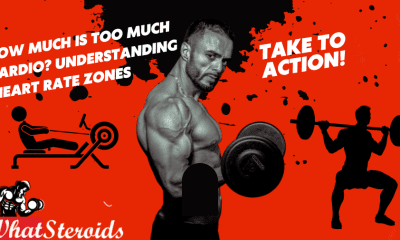
 Bodybuilding1 year ago
Bodybuilding1 year agoHow Much Is Too Much Cardio? Understanding Heart Rate Zones
-
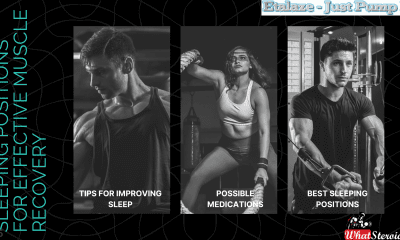
 Steroids9 months ago
Steroids9 months agoSleeping Positions for Effective Muscle Recovery
-
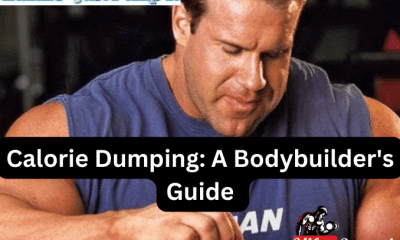
 Bodybuilding1 year ago
Bodybuilding1 year agoCalorie Dumping: A Bodybuilder’s Guide
-
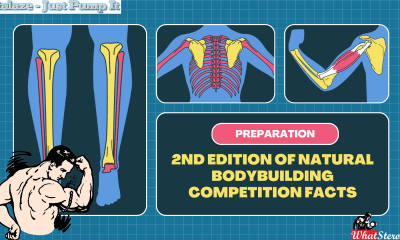
 Bodybuilding8 months ago
Bodybuilding8 months ago2nd Edition of Natural Bodybuilding Competition Facts
-
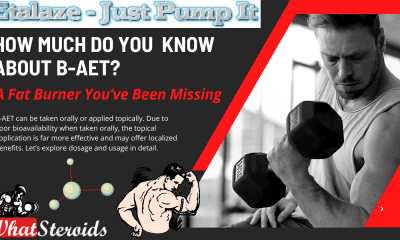
 Anabolic Steroids12 months ago
Anabolic Steroids12 months agoHow Much Do You Know About B-AET? A Fat Burner You’ve Been Missing
-
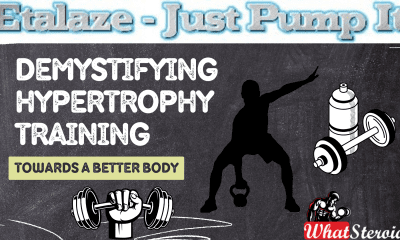
 Bodybuilding1 year ago
Bodybuilding1 year agoDemystifying Hypertrophy Training
-
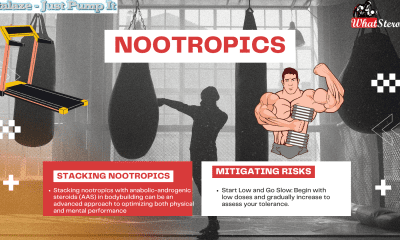
 Bodybuilding8 months ago
Bodybuilding8 months agoAre Nootropics a Better Option to AAS?
-

 Product Reviews11 months ago
Product Reviews11 months agoTop Vitamins for Skin Health
-
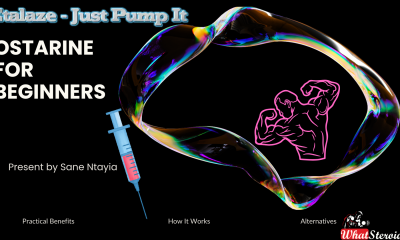
 Steroids4 months ago
Steroids4 months agoOstarine For Beginners: The Ultimate Guide

